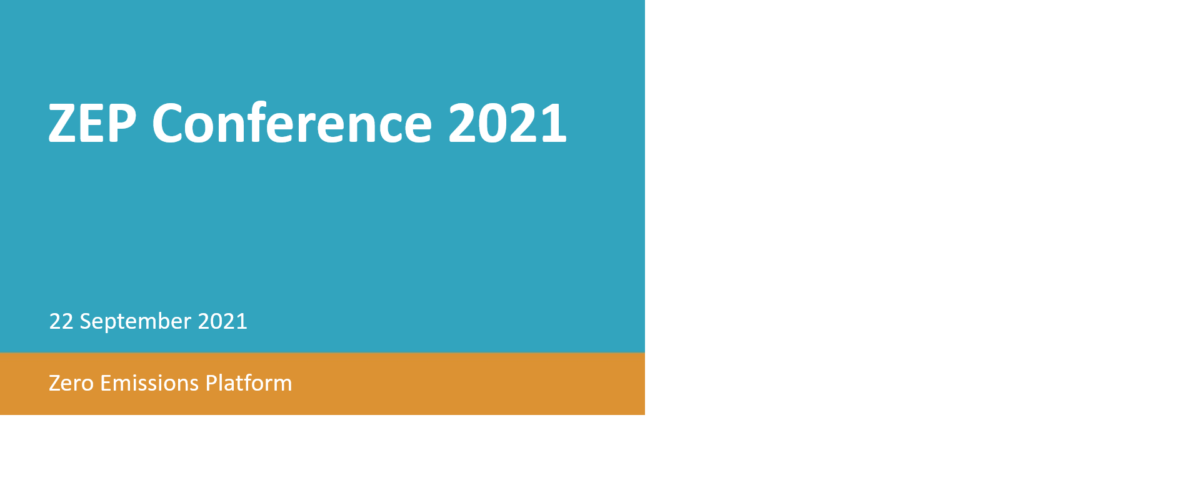Zero Emissions Platform Conference 2021
Zero Emissions Platform Conference 2021
On 22 September, the Zero Emissions Platform Conference 2021 took place online, coordinated with the ZEP 68th Advisory Council meeting and as a ‘grant farewell’ for ZEP 2018-2021.
The conference programme saw discussions reflect on CCS and CCU developments over the past three years, as well as highlight the main challenges going forward. ZEP was pleased to welcome a number of expert speakers from the CCS/CCU community and representatives from the European Commission and EU member state governments to participate in the discussions. The conference programme can be found here.
The conference began with the opening remarks from ZEP Chairman Dr Graeme Sweeney, who noted that the conference was a ‘grant farewell’ to ZEP 2018-2021 and thanked the European Commission, the CCUS community, and the members of ZEP for their fantastic support, which developed the programme into a success.
Clara de la Torre, Deputy Director-General of DG CLIMA, European Commission, gave the keynote speech at the event, highlighting that “in achieving the goals of the European Green Deal, CCS and CCU will play a critical role. Modelling tools show that net-zero compliant scenarios rely on CCS and CCU.”
Following the opening remarks, the main sessions began, which focused on three main challenges for CCS and CCU.
Challenge 1 focused on Incentivising CO2 storage from three different perspectives:
- Jonas Helseth, Bellona, talked about the importance of CO2 storage from a societal perspective.
- Joëlle Rekers, Dutch Government, discussed CO2 storage in The Netherlands, the political and financial frameworks in place to support projects, and the outlook.
- Nicolò Aggogeri, Eni, presented the perspective of developing CO2 storage projects, providing examples from the UK and Italy.
Challenge 2 saw the discussion turn to the topic of cross-border European CO2 transport & storage infrastructure.
- Mark Driessen, Porthos, brought the perspective of a CO2 infrastructure project in The Netherlands.
- Kim Bye Bruun, Northern Lights JV, presented the Northern Lights projects, discussing the positive developments to date and next plans.
- Svante Söderholm, Swedish Energy Agency, provided an insight into how CO2 infarstructure is developing in Sweden and the attitude to CCS.
- Benjamin Denis, IndustriALL, discussed how CO2 infrastructure and CCS can play a role in safeguarding and creating industrial activity and jobs in Europe.
Challenge 3 looked at Carbon Capture – Innovation success stories, and saw a discussion on past and present CCS R&I and opportunities for industrial decarbonisation.
- Nils Røkke, SINTEF, provided a background on CCS research and innovation
- Jan Theulen, HeidelbergCement, presented an example of a CCS success story in the LEILAC project.
In the final session, the discussion turned to opportunities and challenges for the new ZEP 2022.
- Lamberto Eldering, ZEP Vice-Chair, addressed the positive political momentum around CCS and CCU, and opportunities with the new ZEP grant to strengthen the platform’s role, the dialogue between stakeholders, policymakers, and EU member states.
- Chris Bolesta, DG ENER, European Commission, further emphasised the positive momentum for CCS and CCU in Europe and highlighted the upcoming high-level CCUS Forum.
- Naomi Cambien, Flemish Government, provided an update on Belgium’s perspective on developing CCS, projects in Flanders, and the ambition to further establish CCS.
As the conference came to a close, Lamberto Eldering emphasised three crucial items for CCUS to get to where it needs to be in 2030 for a cost-efficient transition towards climate neutrality in the EU:
- CO2 transport and storage infrastructure is vital for European decarbonisation. Support for CO2 transport and the inclusion of CO2 storage and all modalities of CO2 transport in EU legislation is necessary. CO2 infrastructure should be recognised in the Ten-Year Network Development Plan.
- An enabling policy and funding framework for CCS and CCU, making it feasible to invest in these technologies and to scale up in this decade. The EU has a good starting point in the EU Taxonomy for Sustainable Activities.
- Political recognition of CCS and CCU and CO2 infrastructure is key. ZEP is really looking forward to continuing to help the EU Commission in 2022 and the new ZEP grant.
Watch the conference recording:
